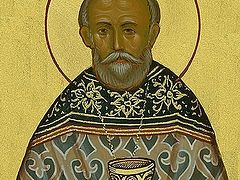Source: Orthodox History
May 20, 2025
 In 1894, Pope Leo XIII issued a papal encyclical on the “Eastern Rites”—that is, the Uniates, those groups who use traditional Orthodox liturgical rites but submit themselves to the Pope of Rome. In 1898, St Raphael Hawaweeny, then an archimandrite in New York, published a response to the papal encyclical in a periodical called Faith and Reason, and this was later reprinted in both Russian and English in the Vestnik, the bimonthly journal of the Russian diocese in America. In the article, St Raphael first quotes extensively from the pope’s encyclical, and then goes on to pick apart Roman Catholicism. St Raphael is not really diplomatic or delicate — he seems to view this article as a defense of Orthodoxy against a threat.
In 1894, Pope Leo XIII issued a papal encyclical on the “Eastern Rites”—that is, the Uniates, those groups who use traditional Orthodox liturgical rites but submit themselves to the Pope of Rome. In 1898, St Raphael Hawaweeny, then an archimandrite in New York, published a response to the papal encyclical in a periodical called Faith and Reason, and this was later reprinted in both Russian and English in the Vestnik, the bimonthly journal of the Russian diocese in America. In the article, St Raphael first quotes extensively from the pope’s encyclical, and then goes on to pick apart Roman Catholicism. St Raphael is not really diplomatic or delicate — he seems to view this article as a defense of Orthodoxy against a threat.
Recently, a longer Arabic response by St Raphael was digitized. It appears that the English translation, along with the Russian that accompanied it in the Vestnik, is abridged version of that Arabic original. You can view the Arabic here, and once it’s been translated into English, we’ll be sure to let our readers know. In the meantime, you can get a good feel for St Raphael’s views and arguments in the text below…
Anyone not familiar with the subtle methods of the Roman Curia may possibly imagine, on reading this epistle, that it guarantees, entirely and forever, the inviolability of the sacred rites and patriarchal rights of the various Christian communities united to Rome, against any attempts at latinisation or attacks on the part of papal legates and numerous varieties of Latin priests and monks. But is it so in reality? We will not bring out here the long series of historical facts which prove to evidence the flimsiness and fallaciousness of papal declarations and promises even more solemn than these, in the matter of preserving intact the local usages, rites, and even dogmas peculiar to the churches which have become “united” to the Roman Church.
To become convinced of the fallaciousness of such promises, it is enough to read with attention this epistle of Pope Leo XIII, in which he, on one hand, forbids his legates and monks to interfere in the future with church affairs of the Eastern Christian communities subject to the papal See, and, on the other hand, permits and authorises those same Latin legates and monks to conduct the education of native children and youths…
Any one who knows anything at all about the methods of instruction followed in Latin schools will easily see that this prohibition to monks and priests to interfere in local church affairs amounts to nothing compared to the authority given to the same monks to conduct the schools. Who does not know that all young people who have received their education in Latin schools, come out of them more Latin than the real born Latins? What is the sense, then, of this papal epistle, when it gives into the hands of Latin priests and monks the most important thing of all—the bringing up of the young generation?
… Read the rest at Orthodox History.
Follow OrthoChristian on Twitter, Vkontakte, Telegram, WhatsApp, MeWe, and Gab!



